最新牛津英语四年级下册知识点梳理
深圳市沪教牛津版四年级英语(下)册知识点总结

Unit1Touch and feel1.学会询问触觉感受的句子,如:Touch this.How does it feel?2.学会使用一些形容词来描述物品的特点,如:It’s soft./It’s hard.3.学会根据触觉来猜测物品,如:—It's hard.—What is it?—Is it an apple?—Yes,it is.touch碰;触摸feel摸起来;感到soft柔软的hard坚硬的thick厚的;粗的thin薄的;细的hear听到young年轻的noise响声;吵闹声men男人(复数)blind瞎的;失明的1.—Touch this,Alice.How does it feel?摸摸这个,Alice。
感觉它是怎样的?—It's soft.它是软的。
2.Well done!做得很好。
Unit2Smell and taste1.学会使用“看”、“闻”和“尝”三个感官动词,如:①Look,Joe.②Smell this.③Taste it.2.学会使用选择疑问句,如:Is it strawberry juice or watermelon juice?3.学会使用形容词来对事物进行描述和判断,如:It's sweet and sour.It’s strawberry juice!grape葡萄strawberry草莓watermelon西瓜juice果汁smell闻;嗅taste品尝sweet甜的sour酸的or或者;还是wait等待;等候minute一会儿;分钟get得到fox狐狸round圆的purple紫色的those那些1.I have some juice here.我这儿有些果汁。
2.Smell this.闻闻这个。
3.Is it strawberry juice or watermelon juice?这是草莓汁还是西瓜汁?4.Taste it.尝尝它。
沪教牛津版四年级英语下册全册知识点汇总清单
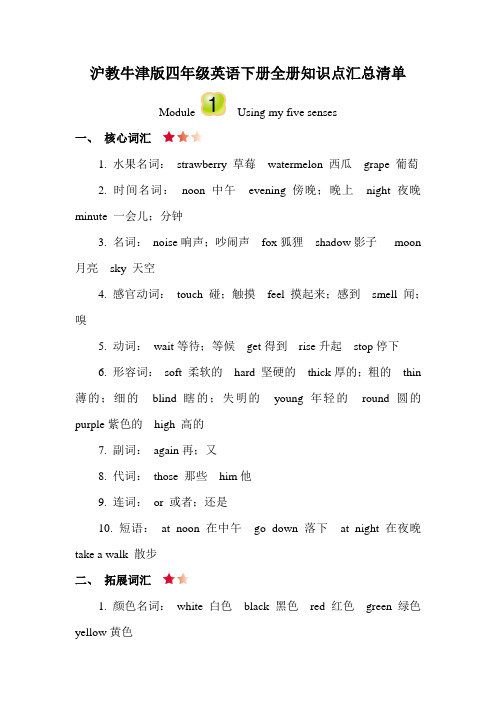
沪教牛津版四年级英语下册全册知识点汇总清单Module Using my five senses一、核心词汇1. 水果名词:strawberry 草莓watermelon 西瓜grape 葡萄2. 时间名词:noon 中午evening傍晚;晚上night 夜晚minute 一会儿;分钟3. 名词:noise响声;吵闹声fox狐狸shadow影子moon 月亮sky 天空4. 感官动词:touch 碰;触摸feel 摸起来;感到smell 闻;嗅5. 动词:wait等待;等候get得到rise升起stop停下6. 形容词:soft 柔软的hard 坚硬的thick厚的;粗的thin 薄的;细的blind 瞎的;失明的young 年轻的round 圆的purple紫色的high 高的7. 副词:again再;又8. 代词:those 那些him他9. 连词:or 或者;还是10. 短语:at noon 在中午go down 落下at night 在夜晚take a walk 散步二、拓展词汇1. 颜色名词:white 白色black 黑色red 红色green 绿色yellow黄色2. 水果名词:apple 苹果pear 梨banana 香蕉3. 名词:sun 太阳star 星星4. 动词:see 看见taste 品尝hear 听5. 形容词:long 长的short 短的sweet 甜的sour 酸的old 老的三、核心句型1. —How does it feel? 感觉如何?—It’s soft. 它是柔软的。
解读:这是询问对某物的触觉感觉的句型及其回答。
举一反三:—How do the apples feel? 这些苹果你感觉如何?—They are hard. 它们是硬的。
2. —What is it? 它是什么?—It’s a toy bear. 它是一只玩具熊。
解读:这是询问物品名称的句型及其回答。
最新牛津英语上海版4年级下册知识点整理
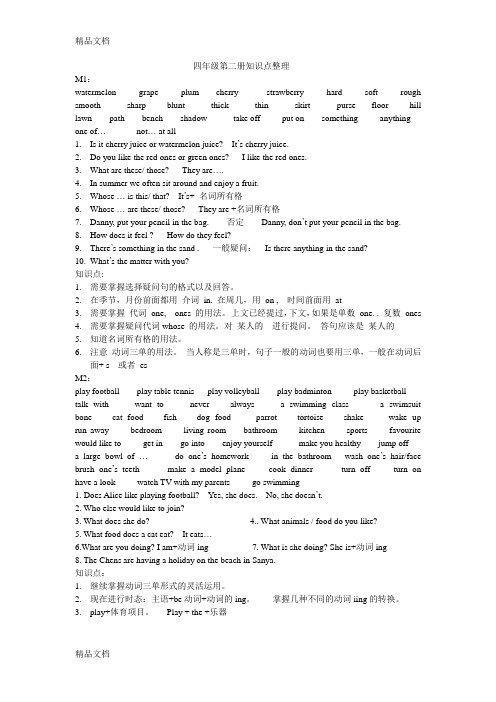
四年级第二册知识点整理M1:watermelon grape plum cherry strawberry hard soft rough smooth sharp blunt thick thin skirt purse floor hill lawn path bench shadow take off put on something anything one of…not… at all1.Is it cherry juice or watermelon juice? It’s cherry juice.2.Do you like the red ones or green ones? I like the red ones.3.What are these/ those? They are….4.In summer we often sit around and enjoy a fruit.5.Whose … is this/ that? It’s+ 名词所有格6.Whose … are these/ those? They are +名词所有格7.Danny, put your pencil in the bag. __否定__ Danny, don’t put your pencil in the bag.8.How does it feel ? How do they feel?9.There’s something in the sand . 一般疑问:Is there anything in the sand?10.What’s the matter with you?知识点:1.需要掌握选择疑问句的格式以及回答。
2.在季节,月份前面都用介词in. 在周几,用on , 时间前面用at3.需要掌握代词one, ones 的用法。
上文已经提过,下文,如果是单数one. . 复数ones4.需要掌握疑问代词whose 的用法。
牛津英语四年级下册知识点整理.docx
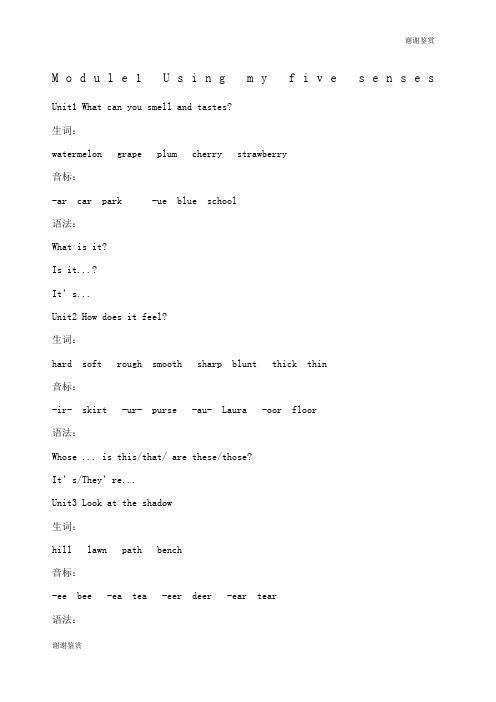
M o d u l e1U s i n g m y f i v e s e n s e s Unit1 What can you smell and tastes?生词:watermelon grape plum cherry strawberry音标:-ar car park -ue blue school语法:What is it?Is it...?It’s...Unit2 How does it feel?生词:hard soft rough smooth sharp blunt thick thin音标:-ir- skirt -ur- purse -au- Laura -oor floor语法:Whose ... is this/that/ are these/those?It’s/They’re...Unit3 Look at the shadow生词:hill lawn path bench音标:-ee bee -ea tea -eer deer -ear tear语法:It + v.(does)...Module2 My favourite thingsUnit1 Sports生词:play football play table tennis play volleyball play badminton play basketball音标:-i- five -ie pie语法:Does...like...(doing)?Yes,...does. / No,...doesn’t.Unit2 Cute animals生词:bone cat food parrot fish dog food tortoise音标:-oe Joe -oa- goat -o Flo语法:What does...(do)?...(does)...Eg: What animals do you like? I like cats.What food does a cat eat? It eats cat food.Unit3 Home life生词:bedroom living room bathroom kitchen音标:谢谢鉴赏-oy toy -oi- noise语法:...am/is/are...(doing)Module3 Things around usUnit1 Sounds生词:quiet loud bell television音标:-are square -ear bear -air hair语法:Is/are...(doing)?Yes,...is/are. No,...isn’t/aren’t.Unit2 Time生词:seven o’clock a quarter past seven half past seven a quarter to eight get up brush my teeth wash my face have breakfast音标:-ou- mouse ow- owl语法:What are you doing?I’m...What time is it?It’s...Unit3 Days of the week生词:谢谢鉴赏always usually often sometimes never音标:-ay May -ai- wait语法:What do you usually do?Sb. Usually/often/always/sometimes/never ...Module4 More things to learnUnit1 A music class生词:piano violin triangle drum音标:Where’s...?It’s...Whose...is this?It’s...Unit2 Festivals in China生词:the Spring Festival the Dragon Boat Festival the Middle-autumn Festival the Double Ninth Festival语法:When is ...Festival?Is it hot/sunny/...at...Festival?What do you do in ...Festival?What special food do you eat at...?Unit3 Story time谢谢鉴赏生词:duckling swan nest。
牛津版英语四年级下册知识点总结

牛津版英语四年级下册知识点总结摘要:一、牛津版英语四年级下册知识点概述1.课程教材简介2.知识点涵盖范围二、Unit 1 - Using My Five Senses1.单元主题2.核心词汇3.语法知识点三、Unit 2 - My Family1.单元主题2.核心词汇3.语法知识点四、Unit 3 - Food and drinks1.单元主题2.核心词汇3.语法知识点五、Unit 4 - Time1.单元主题2.核心词汇3.语法知识点六、Unit 5 - We Love Animals1.单元主题2.核心词汇3.语法知识点七、Unit 6 - My Holiday1.单元主题2.核心词汇3.语法知识点八、Unit 7 - My Day1.单元主题2.核心词汇3.语法知识点九、Unit 8 - Days of the Week1.单元主题2.核心词汇3.语法知识点十、Unit 9 - A Friend in Australia1.单元主题2.核心词汇3.语法知识点正文:一、牛津版英语四年级下册知识点概述牛津版英语四年级下册教材,以生动有趣的主题为核心,通过丰富的语言实践活动,帮助学生全面提高英语能力。
本册教材共包括九个单元,涉及的主题有:使用五官、家庭、食物和饮料、时间、动物、假期、日常生活、一周七天以及国际友谊。
二、Unit 1 - Using My Five Senses本单元的主题是“使用五官”。
学生将学习如何用英语描述视觉、听觉、嗅觉、味觉和触觉的体验。
通过本单元的学习,学生能够更好地理解和运用相关的词汇和表达。
三、Unit 2 - My Family本单元的主题是“我的家庭”。
学生将学习如何用英语介绍家庭成员、职业和家庭关系。
通过本单元的学习,学生能够更好地掌握家庭成员的词汇和相关的语法结构。
四、Unit 3 - Food and Drinks本单元的主题是“食物和饮料”。
学生将学习如何用英语描述各种食物和饮料的名称、味道和喜好。
四年级英语下册Module2知识梳理(牛津上海版试用本)

M2U1 Sports知识梳理一、重点词汇(需背默):sport运动、club俱乐部、play football踢足球、play table tennis打乒乓(= play ping pong)、play volleyball打排球、play badminton打羽毛球、play basketball 打篮球、poster海报、else其他的、join参加,加入、never从不、notice通知,注意、swimsuit游泳衣、goggles护目镜、remember记住、before在…之前(指时间,反义词是after)、healthy健康的、spare节省,空闲的、paint画画、line 线,排、mine我的(名词性物主代词)、smile微笑、french fries薯条、hobby 兴趣(复数hobbies)二、重点词组(需背默):badminton club羽毛球俱乐部、my favourite sport我最喜欢的运动、join the club 参加俱乐部、would like to do sth.=want to do sth. 想做某事、play…with sb.和某人一起玩……、talk with sb. 和某人交谈、get in your eyes进入你的眼睛、warmup exercises热身运动、go into the swimming pool进入游泳池、make sb. healthy使某人健康、enjoy oneself过得快乐、in a line在一条线上三、重点句型(需背默):1、Would you like to join the badminton club? Yes, I’d like to./Yes, I’d love to.你想参加羽毛球俱乐部吗?是的,我愿意。
(Would you like to …的问句语气比较客气)2、Would you like to join the volleyball club? I’d like to, but I can’t play volleyball. 你想参加排球俱乐部吗?我很想参加但是我不会打排球。
新牛津译林版四年级下册英语全册知识点
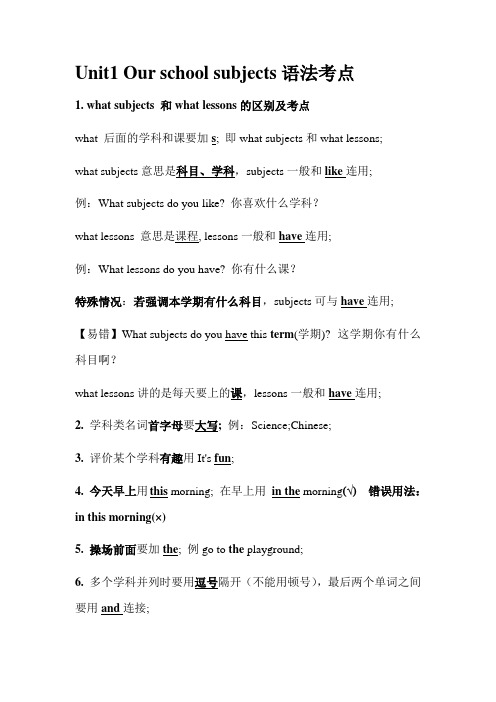
Unit1 Our school subjects语法考点1. what subjects 和what lessons的区别及考点what 后面的学科和课要加s; 即what subjects和what lessons;what subjects意思是科目、学科,subjects一般和like连用;例:What subjects do you like? 你喜欢什么学科?what lessons 意思是课程, lessons一般和have连用;例:What lessons do you have? 你有什么课?特殊情况:若强调本学期有什么科目,subjects可与have连用;【易错】What subjects do you have this term(学期)? 这学期你有什么科目啊?what lessons讲的是每天要上的课,lessons一般和have连用;2.学科类名词首字母要大写; 例:Science;Chinese;3. 评价某个学科有趣用It's fun;4. 今天早上用this morning; 在早上用in the morning(√) 错误用法:in this morning(×)5.操场前面要加the; 例go to the playground;6. 多个学科并列时要用逗号隔开(不能用顿号),最后两个单词之间要用and连接;例:We have Music, Art, PE and Maths.Unit2 After school语法考点1. 星期考点①星期一到星期天分别是(拼写):星期一Monday;星期二Tuesday;星期三Wednesday;星期四Thursday;星期五Friday;星期六Saturday;星期天Sunday;②英语中,一个星期的第一天是星期天;【易错】Sunday is the first(第一) day of a week(一周).③在星期几前面的介词用on; 即on + 星期几; 在星期几的上午或下午直接在星期后加morning或afternoon; 正确用法:on Sunday morning 在星期天上午(√) 错误用法:in the morning on Sunday(×)④对星期几提问特殊疑问词用What day; 回答星期几用It's + 星期几;2. It's time for / to考点(是时候做...)It’s time for后接名词例:It's time for school. school 为名词It's time to 后接动词词组例:It’s time to go to school. go to school为动词词组例:It’s time for lunch(名词). It’s time to have(动词) lunch.3. some、any 考点①some在部分疑问句和否定句中要改为any②用于征求对方意见并且希望得到肯定答复的时候,some无须改为any;总结为以下3种情况(1)Would you like some ... ? (2)What/How about some ... ? (3)Can I have some ...?4. like考点①like后接可数名词要用复数形式; 例:like mangoes②★能力题:like后接动词时要用动词ing形式; 例:like playing basketballUnit3 My day 知识点单词、词组、句子见书上1. 时间介词in, on, at 的考点in 考点①四季前介词用in, 中间不加任何冠词。
最新牛津英语四年级下册知识点整理
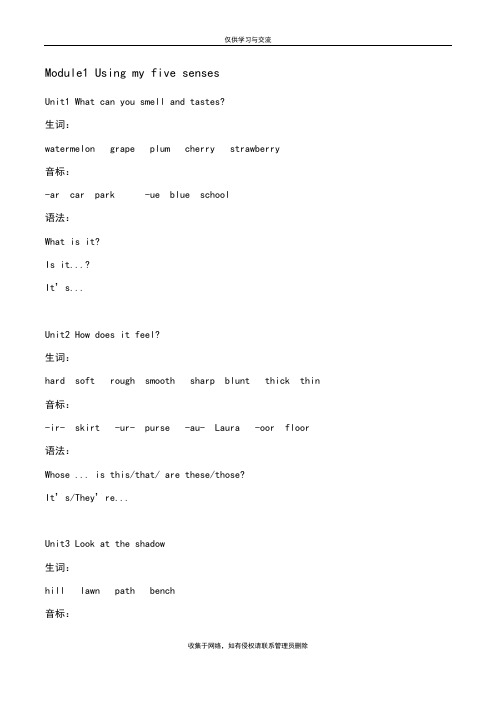
Module1 Using my five sensesUnit1 What can you smell and tastes?生词:watermelon grape plum cherry strawberry音标:-ar car park -ue blue school语法:What is it?Is it...?It’s...Unit2 How does it feel?生词:hard soft rough smooth sharp blunt thick thin 音标:-ir- skirt -ur- purse -au- Laura -oor floor 语法:Whose ... is this/that/ are these/those?It’s/They’re...Unit3 Look at the shadow生词:hill lawn path bench音标:-ee bee -ea tea -eer deer -ear tear语法:It + v.(does)...Module2 My favourite thingsUnit1 Sports生词:play football play table tennis play volleyball play badminton play basketball音标:-i- five -ie pie语法:Does...like...(doing)?Yes,...does. / No,...doesn’t.Unit2 Cute animals生词:bone cat food parrot fish dog food tortoise音标:-oe Joe -oa- goat -o Flo语法:What does...(do)?...(does)...Eg: What animals do you like? I like cats.What food does a cat eat? It eats cat food.Unit3 Home life生词:bedroom living room bathroom kitchen音标:-oy toy -oi- noise语法:...am/is/are...(doing)Module3 Things around usUnit1 Sounds生词:quiet loud bell television音标:-are square -ear bear -air hair语法:Is/are...(doing)?Yes,...is/are. No,...isn’t/aren’t.Unit2 Time生词:seven o’clock a quarter past seven half past seven a quarter to eight get up brush my teeth wash my face have breakfast音标:-ou- mouse ow- owl语法:What are you doing?I’m...What time is it?It’s...Unit3 Days of the week生词:always usually often sometimes never 音标:-ay May -ai- wait语法:What do you usually do?Sb. Usually/often/always/sometimes/never ...Module4 More things to learnUnit1 A music class生词:piano violin triangle drum音标:Where’s...?It’s...Whose...is this?It’s...Unit2 Festivals in China生词:the Spring Festival the Dragon Boat Festival the Middle-autumn Festival the Double Ninth Festival语法:When is ...Festival?Is it hot/sunny/...at...Festival?What do you do in ...Festival?What special food do you eat at...?Unit3 Story time生词:duckling swan nest如何做好团队管理工作一些企业在招聘高层或者中层的时候会要求被应聘者有团队管理经验/或者说团队管理经验很丰富,很多人也都一直都在谈团队管理,那么到底什么是团队,什么是团队管理,如何做好团队管理工作?这不需要太多繁文缛节的文字,我不拿稿费,不需要为了字数而说很多的废话,或许只要你明白到底是怎么回事,并且根据我说的去实践,我相信,不久后你就是一个非常出色的团队管理者。
- 1、下载文档前请自行甄别文档内容的完整性,平台不提供额外的编辑、内容补充、找答案等附加服务。
- 2、"仅部分预览"的文档,不可在线预览部分如存在完整性等问题,可反馈申请退款(可完整预览的文档不适用该条件!)。
- 3、如文档侵犯您的权益,请联系客服反馈,我们会尽快为您处理(人工客服工作时间:9:00-18:30)。
牛津英语四年级下册知识点梳理Unit1 A new student一、单词及词组牛津英语四年级下册知识点梳理2.a teacher(教师)3.a doctor(医生)4. a nurse(护士)5. a boy(男孩)6. a girl(女孩)7. a man(男人)8. a woman(女人)9. new(新的)10. our(我们的)11. school(学生)e(欢迎)13. tree(树)14. climb(攀登)15. again(再;又)16. sir(先生)17. right(正确的)n(下来)19. excuse me(对不起,打扰一下)牛津英语四年级下册知识点梳理牛津英语四年级下册知识点梳理2.you’re = you are3.3. he’s = he is4.4. she’s = she is5.5. I’m = I am6.6. don’t = do not牛津英语四年级下册知识点梳理Unit2 At a party一、单词及词组牛津英语四年级下册知识点梳理2.grandmother(祖母;外祖母)3. father(父亲)4. mother(母亲)5. brother(兄;弟)6. sister(姐;妹)7. hair(头发)8. a head(头)9. a nose(鼻子)10. a mouth(嘴;口)11. an eye(眼睛)12. an ear(耳朵)13. white(白色的)14. a friend(朋友)15. a skirt(短裙)16. a party(宴会)17. with(有)18. which(哪一个)19. big(大的)20. small(小的)21. long(长的)22. short(短的)23. we(我们)24. hurry(赶快)25. wrong(错误的)26. be late for(…迟到)牛津英语四年级下册知识点梳理Unit3 What’s your job?一、单词及词组1. a policeman (policemen)(警察)2. a policewoman (policewomen)(女警察)3. a waiter (waiters)(男服务员)4. a waitress (waitresses)(女服务员)5. a driver (drivers)(司机)6. a worker (workers)(工人)7. a cook (cooks)(厨师) 8. a farmer (farmers)(农民)9. job(职业) 10. name(名字) 11. their(他(她/它)们的) 12. today(今天)13. old(老的) 14. about(大约) 15. want(想要) 16. cold(冷的)17. how old(几岁) 18. how many(多少) 19. look at(看)二、缩写词1. aren’t = are not2. what’s = what is3. they’re = they are三、句型1. What’s your job?(你的职业是什么?)I’m a…(我是一位…)What’s his job?(他的职业是什么?)He’s a…(他是一位…)What’s her j ob?(她的职业是什么?)She’s a…(她是一位…)2. What are their jobs?(他/她们的职业是什么?)They’re…(他/她们是…)3. Are they…?(他/她们是…吗?) Yes, they are.(是,他/她们是的。
)No, they aren’t. They’re…(不,他/她们不是的。
他/她们是…)4. How old are you?(你几岁了?)I’m…(我…) How old is he?(他几岁了?)He’s…(他…) How old is she?(她几岁了?)She’s…(她…)5. What’s your/his/her name?(你/他/她叫什么名字?)I’m/He’s/She’s ××.(我/他/她是××。
)Unit4 Buying fruit一、单词及词组1. an apple (apples)(苹果)2. an orange (oranges)(桔子)3. a banana (bananas)(香蕉)4. a peach (peaches)(桃子)5. a grape (grapes)(葡萄)6. a pineapple (pineapples)(菠萝)7. a watermelon (watermelons)(西瓜)8. a pear (pears)(梨子)9. buy(买) 10. some(一些) 11. fruit(水果) 12. kilo(公斤)13. or(或者) 14. yuan(元) 15.great(好极了)二、缩写词I’d = I would三、句型1. What are these?(这些是什么?)They’re…(它们是…)What are those?(那些是什么?)They’re…(它们是…)2. I’d like some…, please.(我想要一些…)How many kilos?(多少公斤?)…kilo(s), please.(请来…公斤。
) Here are you.(给你。
)Unit6 Let’s go by taxi一、单词及词组1. a station(车站)2. a supermarket(超级市场)3. a library(图书馆)4. a theatre(剧场)5. a hospital(医院)6. an airport(机场)7. by train(乘火车) 8. by plane(乘飞机) 9. by minibus(乘中客车)10. on foot(步行) 11. by taxi(乘公共汽车) 12. how(怎么)13. there(在那里) 14. for(往;向) 15. free(空闲的)16. park(公园) 17. play(玩;参加) 18. football(足球)19. ball(球) 20. Good idea.(好主意。
)二、句型1. Let’s go to the…(让我们一起去…)Good.(好的。
)/Great.(太棒了。
)How do we go there?(我们怎么去那里啊?)Shall we go to (the) …(地点)by …(交通工具)? OK/All right.(好的)2. Is this …(交通工具)for …(地点)?(这辆…是去…的吗?)Yes, it is.(是,它是的。
)/No, it isn’t.(不,它不是的。
)Unit7 At a snack bar一、单词及词组1. a pie (pies)(馅饼)2. a hamburger (hamburgers)(汉堡包)3. a sweet (sweets)(糖果)4. a biscuit (biscuits)(饼干)5. noodles(面条)6. a bar of chocolate(一块巧克力)7. a cup of tea(一杯茶)8. a cup of coffee(一杯咖啡)9. a glass of juice(一杯果汁) 10. a carton of milk(一盒牛奶)11. a snack bar(快餐部) 12. a basketball(篮球) 13. move(移动)14. dear(亲爱的) 15. then(那么) 16. an ice-cream(冰淇淋)17. a cake(蛋糕) 18. water(水) 19. hungry(饿的)19. thirsty(渴的) 20. how much(多少(钱)) 21. see the doctor(看医生)22. What would you like?(你要什么?) 23. How about you?(你怎么样?)24. Something to drink?(要喝些什么吗?) 25. Anything else?(还要别的东西吗?)二、句型1. What would you like?(你要什么?)I’d like… /A/Some…, please.(我想要… /请来一个/一些…)2. How much is it?(它多少钱?)It’s…yuan. /…yuan, please.((它)…元。
)How much are they?它们多少钱?They’re…yuan. /…yuan, please.((它们)…元。
)Unit8 Open Day一、单词及词组1. a chair(椅子)2. a blackboard(黑板)3. a picture(图画)r(计算机) 5. a bookcase(书橱) 6. a music room(音乐室)7. an office(办公室) 8. a playground(操场) 9. our(我们的)10. classroom(教室) 11. open day(接待日) 12. bright(明亮的)13. TV(电视) 14. sometimes(有时) 15. watch(观看)16. piano(钢琴) 17. near(靠近) 18. window(窗户)19. songbook(歌本) 20. lots of = a lot of(许多的) 21. T-shirt(T恤衫)22. smart(好看的) 23. map(地图) 24. them(他/她/它们)25. China(中国) 26. box(盒子) 27. table(桌子)28. read(读)28. I’ve got = I have got(我有)二、缩写词there’s = there is三、句型What’s on/in/near the…?(…上面/里面/旁边有什么?)There’s a … on/in/near the …(有一个…在…上面/里面/旁边。
)There are some … on/in/near the …(有一些…在…上面/里面/旁边。
)Unit9 Breakfast一、单词及词组1. a knife(刀)2. a fork(叉)3. a plate(盘子)4. a bowl(碗)5. a cup(杯子)6. a bottle(狭颈小口瓶)7. a spoon(匙) 8. a glass(玻璃杯) 9. a cupboard(碗橱)10. chopsticks(筷子) 11. rice(米) 12. bread(面包)13. an egg(蛋) 14. a fridge(冰箱) 15. breakfast(早饭)16. no(没有的) 17. a carton of(一(纸)盒) 18. use(使用)19. try(尝试)e(来) 21. dinner(正餐)22. What’s for bre akfast?(早饭吃什么?)二、句型1. Where’s the…?(…在哪里?)It’s on/in/near the…(它在…上面/里面/旁边。
